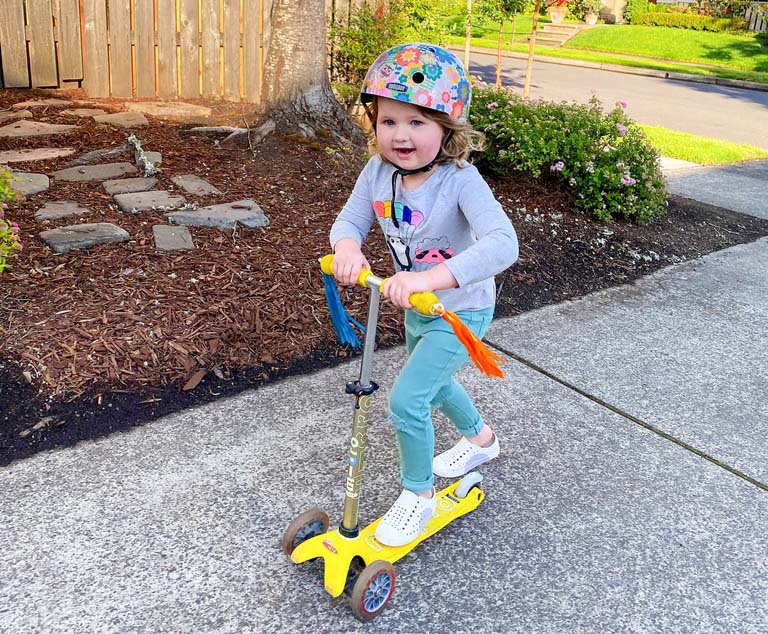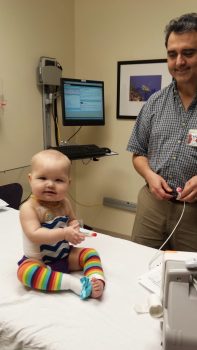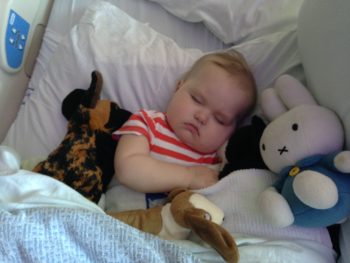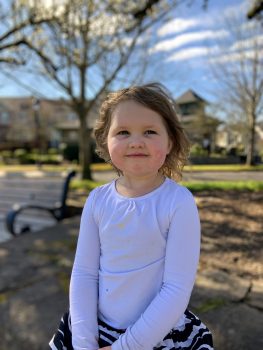Six Years Later: Immunotherapy’s Tiniest Trial Participant Is Living With “So Much Joy”
9.9.2020 | Rose Ibarra

Maggie and Andy Oberhofer watched their tiny, 8-month old daughter, Greta, fight for her life in the Pediatric Intensive Care Unit (PICU) at Doernbecher Children’s Hospital in Portland, Oregon.
Greta had just been through a bone marrow transplant to treat her highly aggressive leukemia. Shortly after, she took a turn for the worse and spent a perilous month in the PICU.
Greta eventually recovered from the transplant and was able to go home, but the family’s reprieve only lasted three months. In March 2014, Greta’s cancer relapsed. Her chance of survival was now 10% or less.
Her parents couldn’t imagine dragging Greta through another bone marrow transplant, so they began to consider end-of-life care for their 13-month-old daughter.
“It was gut-wrenching, knowing her odds were so low,” Maggie said. “We were preparing ourselves to say goodbye to her.”
That’s when they learned about a new option — a cancer immunotherapy trial at Seattle Children’s.
A glimmer of hope
 Both Greta’s oncologist and a friend from a cancer support group mentioned a clinical trial in Seattle that might work for Greta. That friend sent Maggie information on Seattle Children’s Pediatric Leukemia Adoptive Therapy (PLAT) clinical trials. Within an hour, Maggie was on the phone with a principal investigator at Seattle Children’s Therapeutics who explained how immunotherapy works by using a patient’s own immune system to eliminate the cancer.
Both Greta’s oncologist and a friend from a cancer support group mentioned a clinical trial in Seattle that might work for Greta. That friend sent Maggie information on Seattle Children’s Pediatric Leukemia Adoptive Therapy (PLAT) clinical trials. Within an hour, Maggie was on the phone with a principal investigator at Seattle Children’s Therapeutics who explained how immunotherapy works by using a patient’s own immune system to eliminate the cancer.
As luck would have it, Seattle Children’s PLAT-02 study had just opened to babies. No other cancer immunotherapy trials around the country were accepting such young, high-risk patients.
“The doctor explained there was a chance immunotherapy might cure Greta and with fewer side effects than what she’d been through before,” Maggie said. “I was still hesitant to put Greta through more treatment, but we had a glimmer of hope that this just might save her.”
The Oberhofers packed up and were in Seattle a few days later. Once Greta had gained enough weight and was healthy enough to qualify for the trial, she received her reengineered T cells.
Cancer immunotherapy offers turning point
 In days following her T-cell infusion, the Oberhofers waited for Greta to develop a fever — which would show that the T cells were attacking the cancer cells as if they were fighting an infection.
In days following her T-cell infusion, the Oberhofers waited for Greta to develop a fever — which would show that the T cells were attacking the cancer cells as if they were fighting an infection.
“After five days of waiting, I started to doubt it was going to work,” Maggie said. “But they were there for us and talked to me like a doctor and a mother, saying ‘I know it’s hard, but hang in there. We just need to give it time.’”
Two days later, Greta spiked a 104-degree fever and returned to the hospital for supportive care. Once the fever subsided, Maggie and Andy hoped the T cells had destroyed all the cancer cells in Greta’s body.
“It was really hard to imagine that a cancer which had plagued Greta for so long, and made her chances of survival so incredibly low, was going to be eliminated by her own immune system in a matter of days,” Maggie said. “But that’s exactly what happened.”
Living with joy
 In August, Greta celebrated her sixth year in remission, and her parents celebrate their little girl as she blossoms into a bubbly second grader. She may not remember her treatments – but her parents will never forget.
In August, Greta celebrated her sixth year in remission, and her parents celebrate their little girl as she blossoms into a bubbly second grader. She may not remember her treatments – but her parents will never forget.
“Greta was always a fighter,” Andy said. “Through everything that happened to her, I never once thought she was giving up.”
Greta does have some long-term effects from her many cancer treatments. She’s smaller than her peers, has an underactive thyroid and no longer produces B cells, which provide antibodies that typically prevent a person from contracting the same infection repeatedly. Every other week, Maggie gives Greta an infusion of donated plasma containing antibodies.
“She doesn’t remember her treatment and doesn’t know quite how bad it was before her immunotherapy,” Maggie said. “But it seems like her body remembers, because she has an uncanny ability to see the best in things and lives life with so much joy.”
More work needed to bring next frontier in cancer immunotherapy
The Oberhofers say immunotherapy was the gentlest part of Greta’s cancer treatment, comparing the side effects to having the flu.
Still, more research is needed so that all kids diagnosed with cancer can respond to immunotherapy as well as Greta did.
“I hope someday, when another mother walks into a hospital with a pale baby and finds out they have cancer, the doctors will say, ‘We’re going to take some T cells out of your child, put them back in two weeks later, and they will be cured.’”
To every kid that was “out of options” – Seattle Children’s is fighting for you. With your support, Seattle Children’s can accelerate life-saving research to ensure better outcomes for kids with cancer. Be a part of the cure and join our fight today.